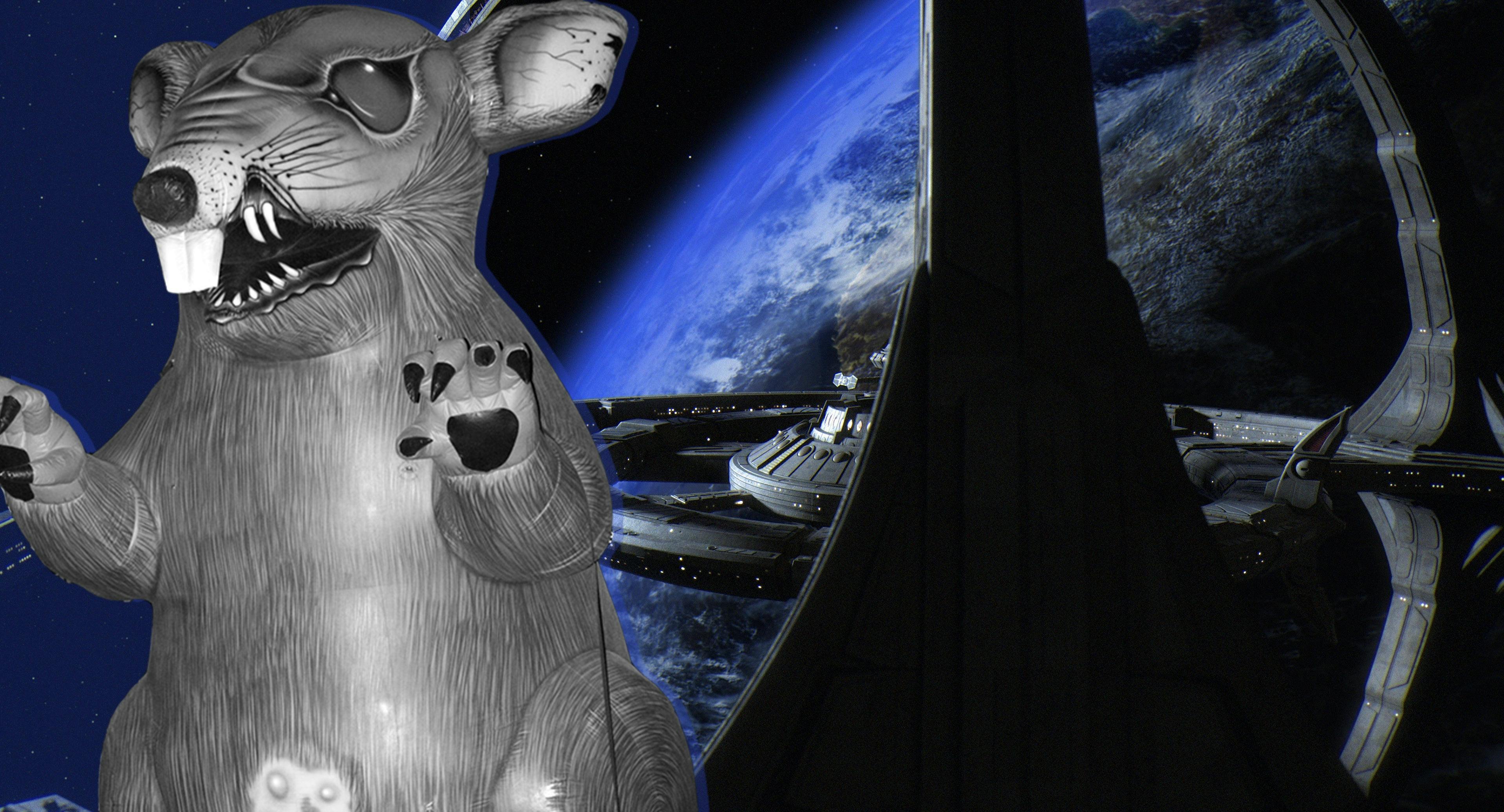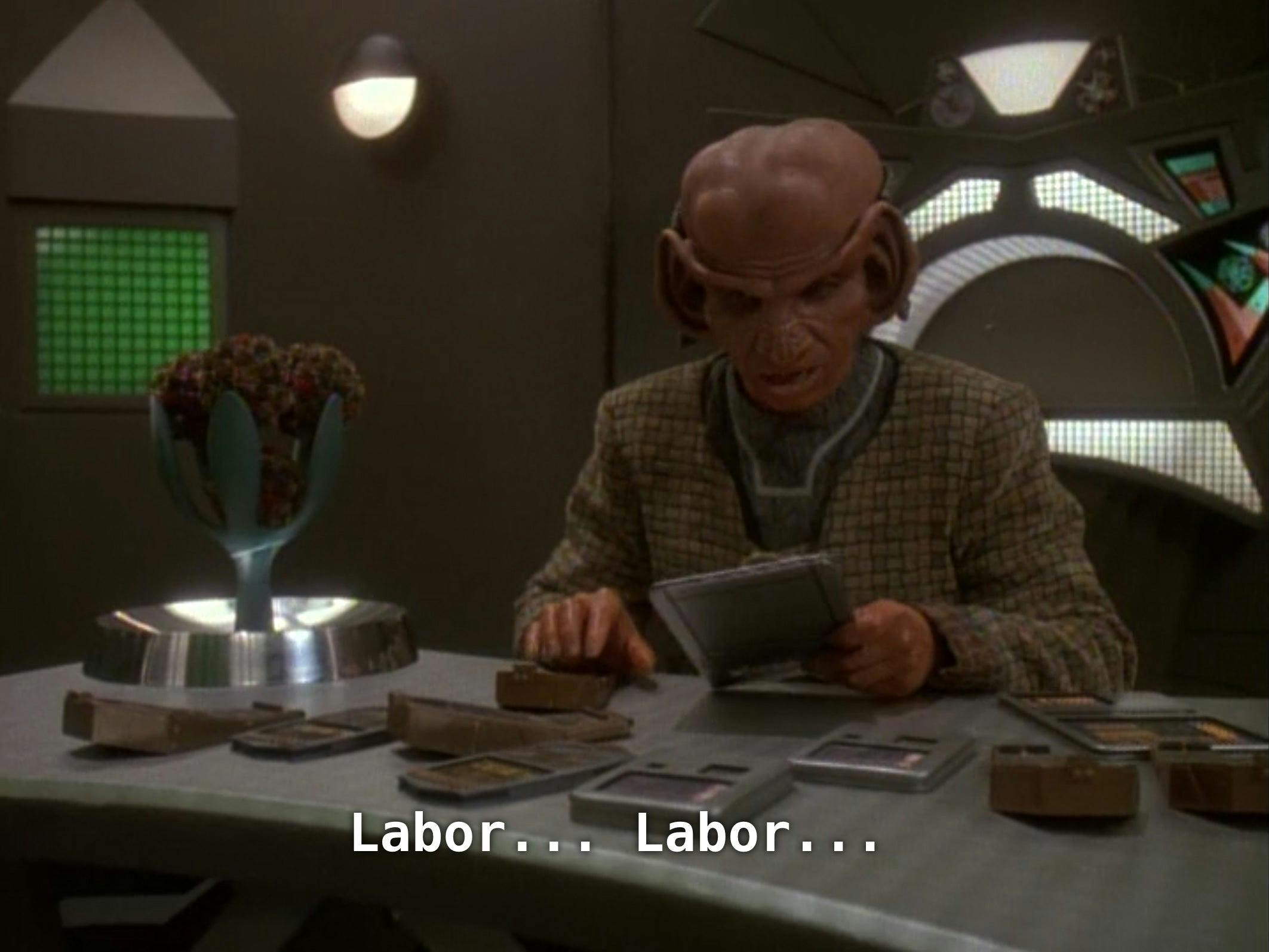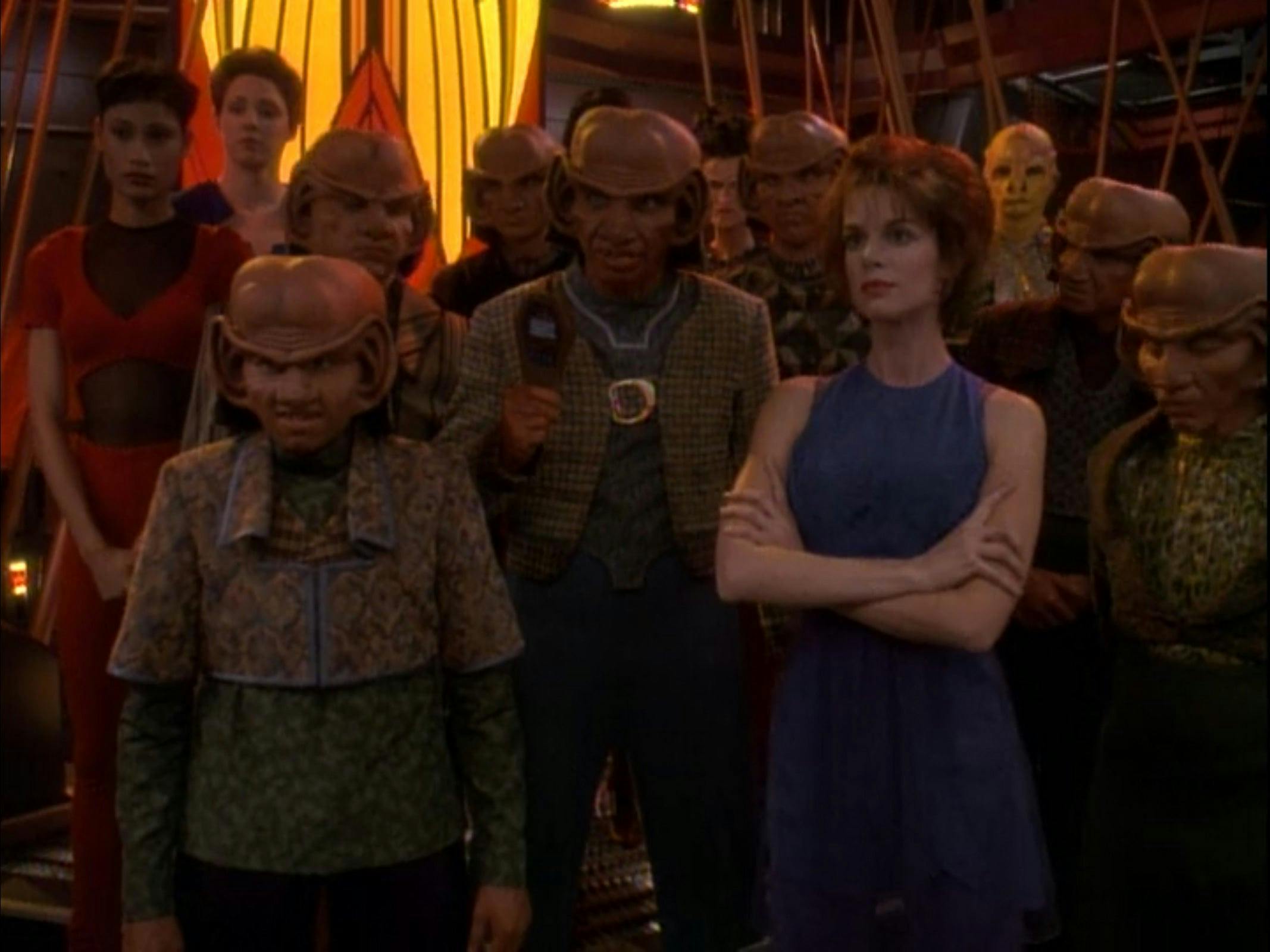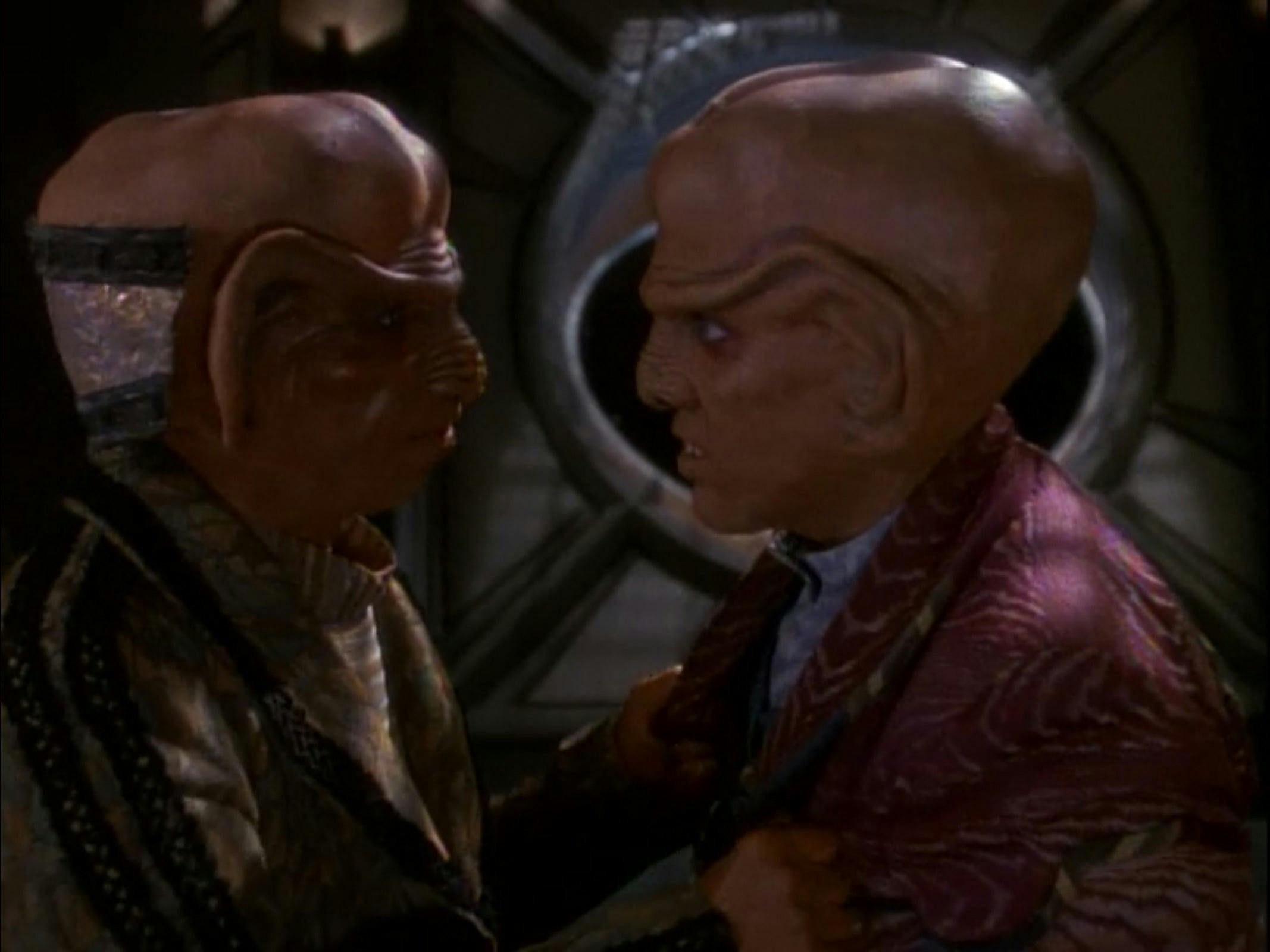Published May 1, 2021
How 'Deep Space Nine' Made a Case for Unions
The pro-union writers of "Bar Association" used Karl Marx, worker intimidation, a strike, and two Ferengi brothers to dramatize the struggle between labor and management.

StarTrek.com
The recently premiered Deep Space Ninedocumentary What We Left Behind makes an argument for the show's importance not just in the Star Trek canon, but in the broad history of American television. Through the expressive guidance of showrunner Ira Steven Behr, it walks through DS9's treatment of race, inequality, war, and sexuality across seven seasons of ambitious, character-driven, and often hysterical storytelling. But there's one always-relevant issue the documentary didn't touch on that the show did: Workers going on strike.
The fourth-season DS9 episode "Bar Association" is the only entry in the totality of Trek's decades-sprawling franchise that meaningfully focuses on labor organizing. It sets two fan-favorite Ferengi brothers—Quark (Armin Shimerman) and Rom (Max Grodénchik)—against each other as manager and employee, and walks through the beats of Rom's radicalization from being a cog in Quark's money-making machine to a union man willing to stand up for himself and his fellow workers. Behr and his co-writer of the episode's teleplay, Robert Hewitt Wolfe, have confirmed that was all by design.

StarTrek.com
"We wanted to do a show about labor... to say something about why labor historically has been good," Wolfe told StarTrek.com, explaining the discussions that fleshed out the episode's original story pitch from Barbara J. Lee and Jenifer A. Lee. A labor episode, produced in a time when union membership was (and still is) in decline, he said, offered them the opportunity to argue for unions while fleshing out the arcs of minor characters like Rom and the Dabo girl Leeta (Chase Masterson). "For most shows, they would just be background, but on Deep Space Nine they deserved to have their own story," he said.
"The main focus was about the two brothers," Behr added. As a character-driven Trek series, more than making a "statement" about unions, he explained, this DS9 episode was meant to illustrate how those themes interacted between the two brothers and their relationship with each other. Through them, "Bar Association" told a story that dramatized the struggles and success that can come with collective bargaining, made a case for the side of labor, and further deepened the beloved lore and characters of DS9. Here's how they made it happen.
Ideological tension from the jump: Ferengi greed vs. labor's struggles
Unlike other Trek shows which focus on the discovery of new civilizations, DS9 sets civilizations up to clash as they coexist on the same titular space station. The Ferengi, a society of unapologetic capitalists, live by ruthless "Rules of Acquisition" and prides themselves in profit at practically any moral cost. The United Federation of Planets (basically) operates a socialist-lite, post-scarcity government—where currency has little use and exploitation is anathema.
The opening minutes of "Bar Association" smash those two ideologies together when Rom gets sick at his job at Quark's bar and casino. Quark says Rom's pay will be docked after he collapses and needs medical treatment. Upon hearing this, the Federation doctor Julian Bashir (Alexander Siddig) suggests Rom and his cohort form a union.
"A what?" Rom asks, as if he'd never heard the word before.
"You know, a trade guild, a collective bargaining association, a union," Dr. Bashir replies, as though it's the most basic concept in the galaxy.
The discussion with Bashir puts the bug in Rom's ear, but Quark is the one who forces Rom's ultimate decision. The next time he sees his brother, Quark informs his entire staff that their pay will be cut by a third because business is particularly slow. When Rom and his coworker Leeta protest, Quark doesn't budge, telling them they can accept it or be laid off.
The writing played with how personal labor-management relations can get
"In this bar, you're not my brother," Quark tells Rom as he delivers the news of the pay cut. "You're my employee. And employees have no right to question the management's decisions." After years of mistreatment, this cold statement steels Rom's resolve. In his next scene, he rallies the staff of Quark's to unionize, arguing that neither Quark nor the Ferengi Commerce Authority cares about their interests.

StarTrek.com
"We've been exploited long enough," Rom tells his coworkers. "It's time to be strong, take control of our lives, our dignity and our profits." By end of the scene, he has them shouting in solidarity, with their fists raised in unison: "Union! Union! Union!"
For the entirety of their lives before this moment, Rom played second fiddle to Quark, both in their acquisition of profits and in their family dynamic. Quark made all the rules before Rom leaned into the power of collective action. Upending that dynamic changed their relationship for the rest of the series, pushing Rom to self-actualize and Quark to soften his view on Ferengi custom.
DS9 dramatized that power shift, Behr said, by leaning into the core of its characters. "It's about family," he explained, "stepping out of your brother's shadow, or a brother having to come to grips with who his brother really is as opposed to who he might want his brother to be."
This tension drives a wedge between the two that results in a captivating meeting where Quark corners Rom in his own quarters and tries to pay him off to end the strike — basically Union Busting 101. Rom defies the bribe and quotes Karl Marx back to Quark: "There's only one thing I have to say to you: 'Workers of the world unite! You have nothing to lose but your chains.'"
Dumbfounded, Quark asks: "What's happened to you?"
Like so many exploitative managers, Quark cannot fathom that Rom finally understands his value and his cohorts' collective power. In his own earlier words to his unionized workers, they could "strike a blow." Quark had provided ample fuel for their fire. ("And we just thought it would be hilarious to have a Ferengi quoting Marx, to be honest," Wolfe laughed. "But that is an important part of the discussion.").
Their labor dispute and the eventual strike is so disruptive — so effective — that the FCA does get wind of it and eventually sends a Ferengi enforcer, Brunt (Jeffrey Combs), to break up the strike. When Brunt threatens to freeze their bank accounts, Rom does not waver, reassuring his coworkers: "If your accounts on Ferenginar were worth anything, you wouldn't be working as a waiter. I'm telling you, nothing has changed. Victory is within our grasp. All we have to do is take it."
Brunt's tactics get more brutal when he threatens Leeta and nearly kills Quark in order to intimidate Rom into ending the strike. Even so, Rom remains invested in his coworkers, bargaining a hard line with Quark in order to secure their pay increases by any means necessary. Pushed to the brink, Quark and Rom arrive at a compromise: Rom will dissolve the union, and Quark will give them raises by the end of the week.
The episode is unabashedly pro-union, as were the people who made it
While Quark, this episode's sympathetic villain, maybe as philosophically anti-union as Brunt is, Shimerman, the actor who played him was not. Ditto for Behr and Wolfe (both raised in union households), as well as much of Hollywood, where individual trades are represented by guilds like the Writers Guild of America West, the Directors Guild of America, the Screen Actors Guild, and more.
"You would never, ever, ever, ever cross a picket line," Behr recalled of growing up in working-class New York, decades ago. One of his first jobs was working in a union office for soft-drink workers, "and these were some tough, tough guys." He also recalled that Shimerman would vocally discuss SAG issues on the DS9 set.
"By and large those unions are very beneficial to us," Wolfe said. "Some of the [DS9] writers, not me, had just been through a writers' strike in the late '80s," Wolfe remembered, and it informed their writing. Today, Wolfe and Behr both vocally support their union, the WGA West on social media. When he was young, Wolfe recalled, his mother was represented by a nurses' union, meaning he would join her on the picket line as early as age 7.
All of these writers and actors grew up and worked in industries where they were represented by trade guilds and where the collective interest trumped individual greed. That history is reflected in the episode, too, when Chief Miles O'Brien (Colm Meaney), who later joins the chorus, emboldens Rom with a story about his ancestor who led a Pennsylvania miners strike: "Eleven months those mines were closed, and they didn't open again until all the miners' demands were met."
As the strike gets underway, O'Brien even gets into a fight with his fellow Federation officer, Commander Worf (Michael Dorn) over breaking the picket line. (The tussle feels like a function of Worf's subplot in the episode, in which he feels increasingly out of place on DS9.) The message tracks with what Behr told StarTrek.com about his own views on unions: "The unions for all their faults and failures — of which there were many — were better than the alternative."
The union's solidarity wins the day, but the conflict doesn't disappear
"There are a lot of people today that think unions are the enemy," Behr lamented. Data released by the Bureau of Labor Statistics show a decline in union membership since the '80s, and with it, declining pay for workers in "production and non-supervisory positions," the largest category of American workers. Right-to-work laws, the rise of contract-based jobs, and the loss of manufacturing jobs all contribute to this, but so does worker apathy and the ahistorical belief that working conditions will naturally improve on their own without anyone taking action to correct them.
"We wanted to give that historical context to show how that worked to a viewership that might be increasingly hostile to the idea of organized labor," Wolfe said. "There's definitely a push-pull power dynamic between labor and capital, and there probably always will be."

StarTrek.com
Rom took action, but the episode doesn't offer a pat solution to the tensions between Quark and Rom, or between Quark and the rest of his workforce. Rom ends the episode a hero, growing closer to his future wife Leeta, leaving Quark's employ, and cheekily vowing to needle his brother in another key Capitalist role: The Customer. And though Rom agrees to dissolve the union, a single raise does not a happy labor-management relationship make. (Just ask any union member who's had to negotiate a second contract with management once the first runs its course.)
Had the DS9 writers wanted to, another union drive that resulted in a true collective bargaining agreement would not have been out of the question. "Bar Association" demonstrated that workers benefit from having a seat at the table, while management benefits from making workers think they don't have the power to grab the chair and sit down.
"People will take your freedom away if you let it happen," Behr said, whether you live in the 20th, 21st, or 24th century. That's what it boils down to. "Somewhere, people are still fighting for a goddamn living wage. They're doing the job and they want to get paid for the job they're doing."
Eric Vilas-Boas (he/him) has previously written for Vulture, Esquire, Thrillist, TV Guide, Paste, Slashfilm, and other outlets. He is a member of the WGA East, and the co-editor of the animation blog The Dot and Line. You can follow him on Twitter.

